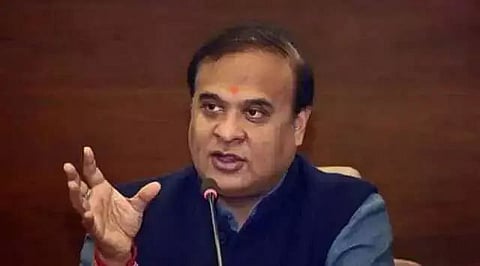
- Home
- Live Blog
- Breaking News
- Top Headlines
- Cities
- NE News
- Sentinel Media
- Sports
- Education
- Jobs

GUWAHATI: Chief Minister Himanta Biswa Sarma of Assam expressed the state government's and the Indian Army's desire for a complete withdrawal of the Armed Forces (Special Powers) Act, 1958 (AFSPA) from Assam. However, the Centre has taken a cautious approach, extending AFSPA's application for six more months in four districts while withdrawing it from four others, effective from October 1.
Sarma highlighted that both the state government and the Indian Army had recommended the complete removal of AFSPA, emphasizing that Assam had achieved a state of complete peace. The Indian Army believes that the "Disturbed Area" tag can be eliminated from all parts of the state. However, he acknowledged the Centre's holistic view, considering factors that may not be readily apparent on the ground.
The extension of AFSPA for six months is viewed as a temporary measure, with the Centre planning to assess the situation for a gradual withdrawal from all state districts. Lt Gen Rana Pratap Kalita, the General Officer Commanding-in-Chief of the Eastern Command, supported Sarma's remarks, emphasizing the critical role played by the Army, Central Armed Police Forces, state police, and the common people in maintaining peace in Assam and the Northeast.
During the unveiling of the statue of Ahom General Lachit Borphukan at Narengi Military Station, Chief Minister Sarma commended the Army's tireless efforts over the last four decades in bringing peace to Assam. He expressed the hope that this peace and development would endure in the region.
AFSPA was extended in the districts of Dibrugarh, Tinsukia, Sivasagar, and Charaideo for six more months but was withdrawn from Jorhat, Golaghat, Karbi Anglong, and Dima Hasao, starting October. The Assam government had previously extended the "disturbed area" notification under AFSPA every six months, starting from November 1990.
AFSPA grants security forces sweeping powers, allowing them to conduct operations and make arrests without prior warrants. It also provides a degree of legal immunity to security forces if operations go awry. However, civil society groups and human rights activists have long called for the repeal of this law, alleging widespread human rights violations by the armed forces in the Northeast.
While Assam's Chief Minister and the Indian Army advocate for a complete withdrawal of AFSPA, the Centre has chosen a more cautious path by extending the law in certain districts, citing the need for a holistic assessment before making a final decision.
ALSO WATCH: